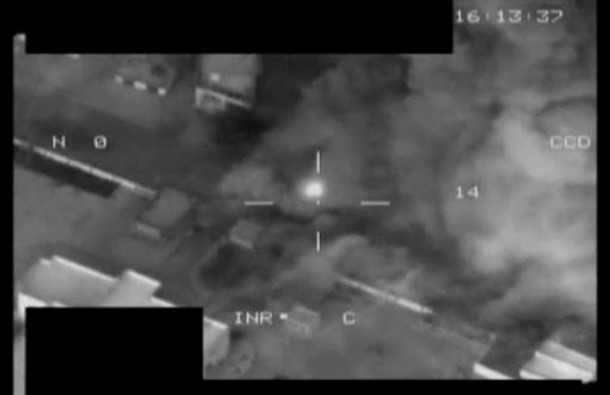
From Nicolas Pelham, the New York Review of Books: Hatched in capitals across Europe and the Arab world, as well as in rebel operation rooms secretly organized in Libya itself, the military campaign took four months of planning. In May, exiled opposition leaders abandoned their jobs as lecturers in American colleges and established an intelligence-gathering bureau on Djerba, the Tunisian island across the border from Libya. Led by Abdel Majid Biuk, an urbane mathematics teacher from Tampa, Florida, the team interviewed four hundred Qaddafi security officers who defected following the loyalist defeat in Misrata; using Google Earth, they analyzed the colonel’s defenses. “We went through the whole city building by building to ascertain its fortifications,” Biuk told me on his arrival in Tripoli.
He passed the data on to a military operations room elsewhere on Djerba whose staff included representatives of NATO and Gulf allies as well as Libyan army veterans who had defected to the US and formed the National Front for the Salvation of Libya (NFSL), an opposition group that led a series of aborted coups in the 1980s and 1990s, before branching into website campaigns. Under the eyes of Tunisian customs officials, they smuggled satellite phones, which are banned in Tunisia, in ambulances across the border into Libya, and set about supplying the rebels. Chevrons were daubed on a straight stretch of road at Rahebat in the Nafusa Mountains, turning it into a landing strip. Military supplies began arriving by the planeload, including 23-caliber tank-piercing bullets.
Tunisia provided a conduit for fighters as well as arms. With Qaddafi’s continued control of the center of the country blocking access over land, Benghazi volunteers took a circuitous route, flying from Egypt to Tunis, before crossing the border at the Tunisian town of Dehiba into the Nafusa Mountains. By mid-August they had established five brigades each with its own mountain training base, and together formed a two-thousand-man battalion under Hisham Buhajiar’s command as well as that of Abdel Karim Bel Haj, a Libyan veteran of the Afghan jihad. Trainers included NFSL veterans. Younger Libyans raised in the US, including the son of a Muslim Brotherhood activist from a US-based company, provided close protection. As they prepared the final stages of their assault, a host of Berber irregulars drawn from towns across the mountains jumped on board. Meanwhile, a collection of local traders, engineers, students, and the jobless from Misrata, battle-hardened by their seventy-day defense of their city, reassembled their brigades and prepared to join the attack on Tripoli from the east, by both road and sea.
Finally, the planners on Djerba divided Tripoli into thirty-seven sectors, and appointed local security coordinators to recruit, train, and arm local cells, using Muslim Brotherhood leaders to bless an armed uprising. “Our first slogan was ‘no’ to the militarization of the intifada,” says Ali al-Salabi, a Muslim Brotherhood politician in exile who worked with the planners, and who was among the first to arrive in Tripoli after Qaddafi’s inner sanctum fell. “But after protesters were gunned down, we realized armed revolution was the only way.”
Among the gunrunners was Salima Abu Zuada, a twenty-six-year-old legal adviser at Qaddafi’s Transport Ministry, who had learned to drive tanks as part of her high school military training. After fleeing to Tunisia in April, she made eight trips by road and tugboat, smuggling hundreds of guns and rocket-propelled grenades back to Tripoli. “Qaddafi didn’t suspect us,” she says. “He thought all women loved him.” Qaddafi’s intelligence chief, Abdullah Senussi, was more wary, however. On two occasions his spooks in Tunisia, she says, tried to run her off the road.
On Saturday, August 20, as dusk descended and the mosques sounded the prayer call for breakfast, Mustafa Abdel Jalil, Qaddafi’s meek-seeming former justice minister who now heads the NTC, went on television to deliver an address. Before he had finished, the rebel flag was flying over Suq al-Juma and other Tripoli neighborhoods. Meanwhile, NATO forces intensified their bombardment of loyalist positions on the western outskirts of Tripoli, stretching to its limits their UN mandate to protect civilians. As the colonel’s forces abandoned their bases, they found themselves sandwiched between rebels sweeping in from the mountains and Tripolitans carving out their own enclaves. Challenged on multiple fronts, Qaddafi’s forces melted away.
The speed of the conquest may yet contain the seeds of its disintegration. Without a common enemy, the diverse opposition could quickly unravel once its composite parts start jostling over the spoils. Already each of the participating groups is leveraging the instrumental role it played in the victory to promote its own interests. Despite earlier protestations that they had no troops on the ground, NATO officials have begun leaking laudatory details of the part played by their special forces in supporting the rebel army. So too have Arab states such as Qatar; and not to be outdone, Turkey has released details of its hundreds of millions in cash handouts to the rebels in the hope that the NTC might both honor the huge contracts Qaddafi gave Turkish construction companies and include Turkey in postwar reconstruction.
United in war, many leading rebels have begun circulating competing narratives of the importance of their respective parts in the operation. The US professors sped to Tripoli from Djerba as soon as the capital fell, claiming that they were the architects of the victory. Some, overcome by the emotion of returning to Tripoli after thirty-five years, broke down in tears before the harsher reality dawned that locals were after the jobs they had prized on the grounds that they had gotten rid of the regime. The Berber fighters who swept down from the mountains underscored their role by daubing the Berber symbol of two back-to-back tridents on the capital’s walls, cars, and barricades. The four-thousand-strong Misrata Brigades took to Tripoli’s central square, firing their antiaircraft guns through the night, lest anyone forget their presence and pugnacity in marching on Tripoli independently of any command on Djerba. (photo: AP)
Image: ap%209%205%2011%20Gaddafi%20tank%20destroyed.jpg
